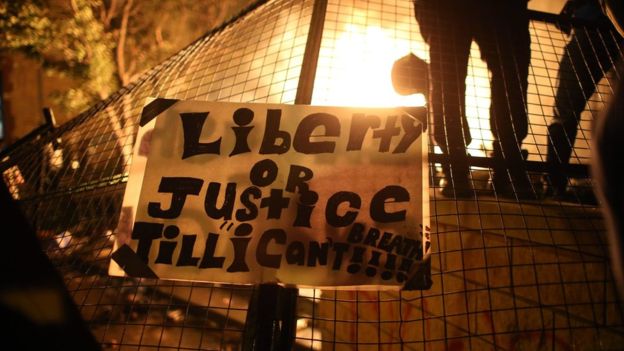Resources for Political Demonstrations Against Police Violence
As we can see in the widespread protests against the murder of George Floyd, people are filled with rage and grief at his individual death and at the systemic violence against Black people in this country. As an organization committed to anti-racism and anti-oppression, we are all feeling that rage and grief ourselves.
This crisis is bringing new people into ongoing political struggles for autonomy, equity, and justice. If that’s you, welcome. Here are some resources to help you stay safe, secure, and informed as you fight against racism and oppression.
Safety & Security
Any time you demonstrate, there is risk. You risk injury, arrest, or other kinds of harm. If you are already marginalized, your risk levels are higher. If you are undocumented, live with disability or illness, your risk levels are higher. Depending on your work, missing a day due to an arrest might cost you your employment.
Right now, COVID-19 is adding additional layers of risk to political protesting. It is challenging to remain truly socially distant during protests, especially when proximity to other protesters can help protect you from police violence. If you do decide to gather in the street, take all of the general public health and safety precautions recommended during the pandemic including wearing a mask, bringing hand sanitizer and gloves, maintaining distance as best as you can. If you are arrested, you will be in physical contact with police, and then possibly crowded into vans and then held in jail while you are being processed, which are notoriously unsafe places during this pandemic.
Before you decide to protest, think about what risk you are willing to take, and how you can mitigate any possible negative effects.
- Digital Security Tips for Protesters
- Know Your Rights
- A Few Small Tips for Attending Your First Protest March
- Jail Support and Solidarity
- The Ruckus Society Action Strategy Guide
-3.jpg?width=370&name=Image%20from%20iOS%20(1)-3.jpg)
-1.jpg?width=370&name=Image%20from%20iOS%20(2)-1.jpg)
.jpg?width=370&name=Image%20from%20iOS%20(5).jpg)
.jpg?width=370&name=Image%20from%20iOS%20(6).jpg)
Image via Unity & Struggle shared during NYC FTP demonstrations
Education
When we see uprisings and crises, it's crucial to understand their deeper roots and contexts. In this case, that means understanding histories of policing in the United States, and histories of racist violence in Minneapolis and beyond. It means thinking about ways to create community safety and accountability without relying on policing and incarcerations.
And for those of us in the arts, it means learning more about how white supremacy operates in our field and how we can undo it.
- Before George Floyd’s Death, Minneapolis Police Failed to Adopt Reforms, Remove Bad Officers
- Racist Roots of American Policing: From Slave Patrols to Traffic Stops
- What To Do Instead of Calling the Police
- Black and Asian-American Feminist Solidarities: A Reading List
- An Open Letter to Arts Organizations Rampant with White Supremacy
Donate
Support Minneapolis-specific funds to help bail out people who have been arrested for protesting or to support Black-led, long-term systemic change.
You can also find similar groups doing work wherever you live. Racism and racist violence isn’t just something that’s happening in Minneapolis. Seek out and support grassroots, Black-led organizations who are working towards long-term, sustainable change in your community. And don’t give money to Shaun King.
- George Floyd Memorial Fund: Fundraiser to support George Floyd’s family, organized by his brother Philonise Floyd
- Black Visions: Black-led, queer, and trans-centered organizing
- Reclaim the Block: Organizing to divest from MPD and live in a police-free world
- MPD150: Participatory, horizontally-organized effort working towards a police-free Minneapolis
Stay safe out there.
About Nina Berman
Nina Berman is an arts industry worker and ceramicist based in New York City, currently working as Associate Director, Communications and Content at Fractured Atlas. She holds an MA in English from Loyola University Chicago. At Fractured Atlas, she shares tips and strategies for navigating the art world, interviews artists, and writes about creating a more equitable arts ecosystem. Before joining Fractured Atlas, she covered the book publishing industry for an audience of publishers at NetGalley. When she's not writing, she's making ceramics at Centerpoint Ceramics in Brooklyn.


